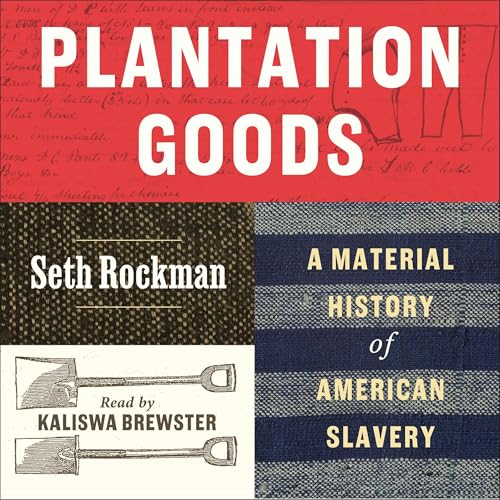
Plantation Goods
A Material History of American Slavery
カートのアイテムが多すぎます
カートに追加できませんでした。
ウィッシュリストに追加できませんでした。
ほしい物リストの削除に失敗しました。
ポッドキャストのフォローに失敗しました
ポッドキャストのフォロー解除に失敗しました
2か月無料体験
聴き放題対象外タイトルです。プレミアムプラン登録で、非会員価格の30%OFFで購入できます。
¥2,200 で購入
-
ナレーター:
-
Kaliswa Brewster
-
著者:
-
Seth Rockman
このコンテンツについて
This is an audiobook version of this book.
A Pulitzer Prize finalist in History, this eye-opening rethinking of nineteenth-century American history reveals the interdependence of the Northern industrial economy and Southern slave labor.
The industrializing North and the agricultural South—that’s how we have been taught to think about the United States in the early nineteenth century. But in doing so, we overlook the economic ties that held the nation together before the Civil War. We miss slavery’s long reach into small New England communities, just as we fail to see the role of Northern manufacturing in shaping the terrain of human bondage in the South. Using plantation goods—the shirts, hats, hoes, shovels, shoes, axes, and whips made in the North for use in the South—historian Seth Rockman locates the biggest stories in American history in the everyday objects that stitched together the lives and livelihoods of Americans—white and Black, male and female, enslaved and free—across an expanding nation.
By following the stories of material objects, such as shoes made by Massachusetts farm women that found their way to the feet of a Mississippi slave, Rockman reveals a national economy organized by slavery—a slavery that outsourced the production of its supplies to the North, and a North that outsourced its slavery to the South. Melding business and labor history through powerful storytelling, Plantation Goods brings northern industrialists, southern slaveholders, enslaved field hands, and paid factory laborers into the same picture. In one part of the country, entrepreneurs envisioned fortunes to be made from “planter’s hoes” and rural women spent their days weaving “negro cloth” and assembling “slave brogans.” In another, enslaved people actively consumed textiles and tools imported from the North to contest their bondage. In between, merchants, marketers, storekeepers, and debt collectors laid claim to the profits of a thriving interregional trade.
Examining producers and consumers linked in economic and moral relationships across great geographic and political distances, Plantation Goods explores how people in the nineteenth century thought about complicity with slavery while showing how slavery structured life nationwide and established a modern world of entrepreneurship and exploitation. Rockman brings together lines of American history that have for too long been told separately, as slavery and capitalism converge in something as deceptively ordinary as a humble pair of shoes.
批評家のレビュー
"Rockman has given us a brilliant book that shows how slavery permeated the American landscape. Clearly written and deeply researched, Plantation Goods is a much-needed contribution to the study of the institution that helped define early America and, therefore, helped make us who we are today." —Annette Gordon-Reed, author of The Hemingses of Monticello: An American Family
"Seth Rockman is one of the most creative and original American historians writing today, as Plantation Goods richly demonstrates. He casts a brilliant new light on the deeply studied subjects of slavery and capitalism." —Marcus Rediker, author of The Slave Ship
"Plantation Goods is the most satisfying history of commodities and one of the most multidimensional histories of slavery I have ever read, embracing as it does consumers, workers, and manufacturers. Critics of the 'slavery's capitalism' framework have sometimes asked, what about the northern economy? Here is the answer, and so much more. Bold yet careful, precise, and thoughtful, Rockman shucks off overreach and sensationalism to deliver the goods." —David Waldstreicher, author of Slavery's Constitution and The Odyssey of Phillis Wheatley



